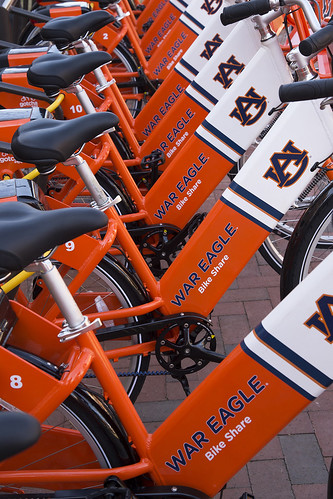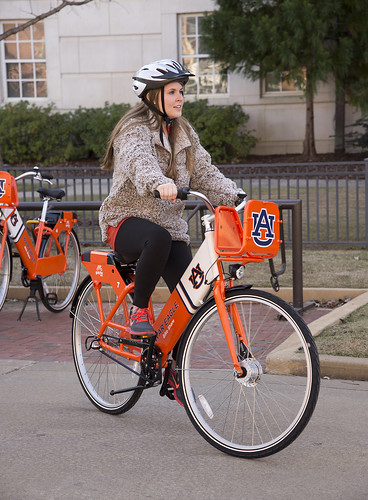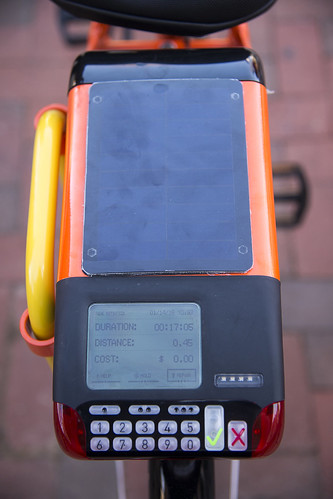Auburn University provides bicycle sharing program for easy transportation around campus
Article body
More Auburn University students will be pedaling through campus thanks to a new bicycle sharing program by Parking Services, which has partnered with The Gotcha Group and local bicycle shops to bring 75 Auburn-themed bicycles to campus.
The War Eagle Bike Share bicycles will be distributed to 10 different stations around campus: Cambridge dorms, Village Dining, South Donahue dorms, Roosevelt Concourse by the College of Sciences and Mathematics, north end of Terrell Dining, South Quad parking deck, College of Veterinary Medicine, the concourse between the Haley Center and Student Center, Lowder Starbucks and on West Thach by the West One parking lot. Bicycles should be available for use by Jan. 31.
"We're enhancing the sustainability of transportation by reducing students' need to bring vehicles to campus," said Don Andrae, Parking Services manager. "If the bicycles placed on campus breed a successful bike share program, we hope to place more War Eagle Bike Share bikes at near-campus apartment complexes so students can ride the bike to and from campus."
The first two hours of use are free each day. After those two hours, users are charged $5 per hour with a maximum usage charge of $25 per day. The bicycles must be picked up and returned to one of the 10 designated locations to avoid a $50 fee for ending a ride outside of one. The charges can be billed to a credit or debit card or to a student's TigerCard.
The process of checking out a War Eagle Bike Share bicycle is simple thanks to the technology the bicycle uses. Users download the Social Bicycles mobile app, enter their information and search for an available bicycle to reserve. The app provides a four-digit pin that users enter on the bicycle keypad to release it. Bicycles can then be parked at any bicycle rack during the ride. Students can hold a bicycle while they are in class by pressing a "hold" button while locking the bicycle to any university rack.
When a user wishes to end the ride and release the bicycle, it must be returned to one of the 10 designated War Eagle Bike Share racks on campus. If a student comes across a bicycle that is not in a designated station and is not currently being held by another user, he or she can receive credit for returning it to a proper location by signing into the app and moving it.
The War Eagle Bike Share bicycles not only show Auburn pride through the colors and logos displayed on them but also have a variety of features. The three-speed bicycles have front and rear lights that allow students to use the bikes at night, as well as puncture-resistant tires to ensure a safe ride with a low probability of a flat tire.
Additionally, Kevlar seats allow rain to roll off for dry seats in any weather and a basket is placed in the front to accommodate a backpack. The bicycle seats are easily adjustable to ensure a comfortable ride regardless of user's height. GPS systems are installed so Parking Services can be aware of the location of each bike in the event of an emergency or necessary immediate repair.
The bicycles receive regular monthly maintenance. If students see an issue with one of the bicycles, they can simply press a "service" button on the bicycle's keypad. An employee from one of the local bicycle shops will then come to campus to fix the issue.
Related Media
Media interested in this story can contact Communications Director Preston Sparks at (334) 844-9999 or preston.sparks@auburn.edu.
Auburn University is a nationally ranked land grant institution recognized for its commitment to world-class scholarship, interdisciplinary research with an elite, top-tier Carnegie R1 classification, life-changing outreach with Carnegie’s Community Engagement designation and an undergraduate education experience second to none. Auburn is home to more than 30,000 students, and its faculty and research partners collaborate to develop and deliver meaningful scholarship, science and technology-based advancements that meet pressing regional, national and global needs. Auburn’s commitment to active student engagement, professional success and public/private partnership drives a growing reputation for outreach and extension that delivers broad economic, health and societal impact.







